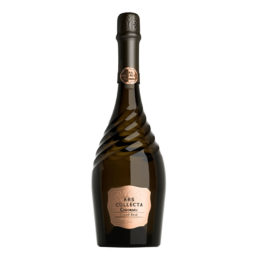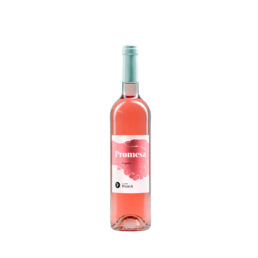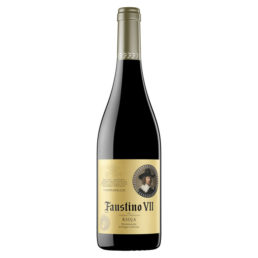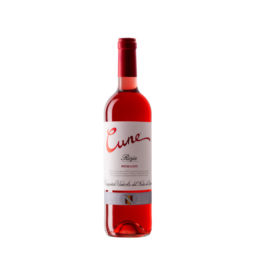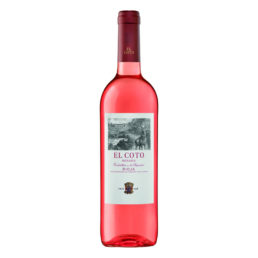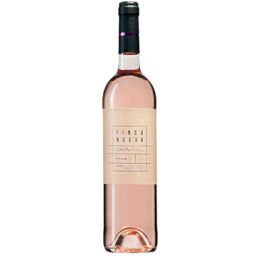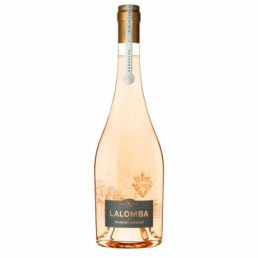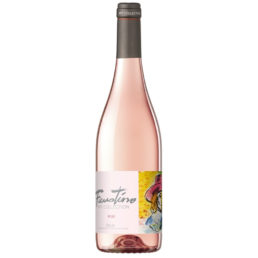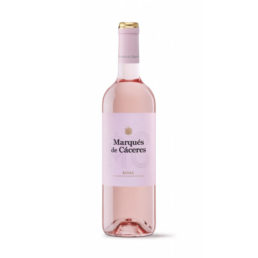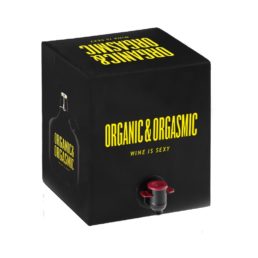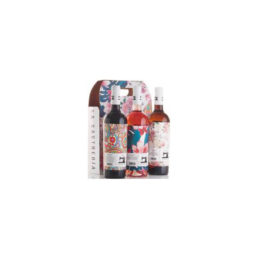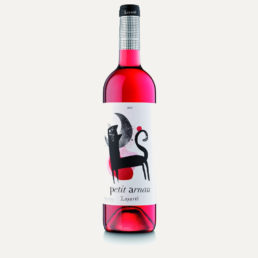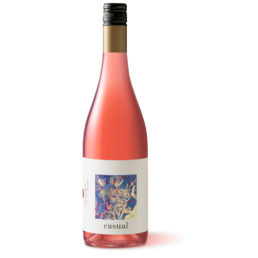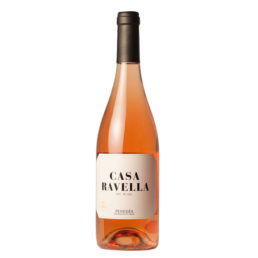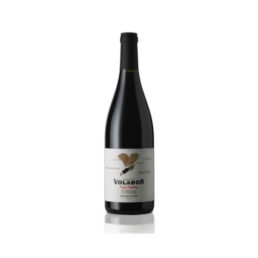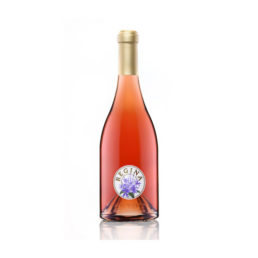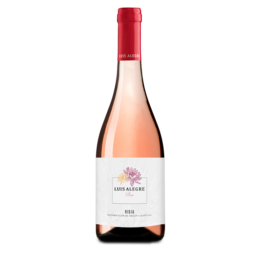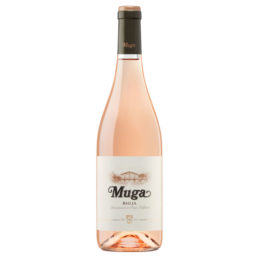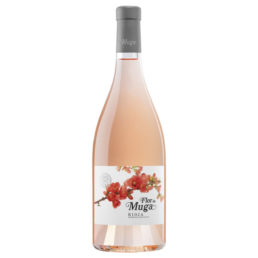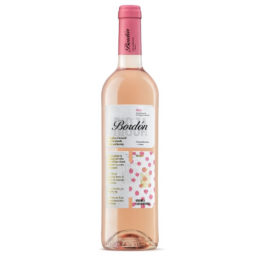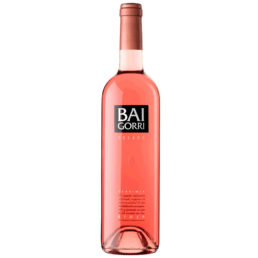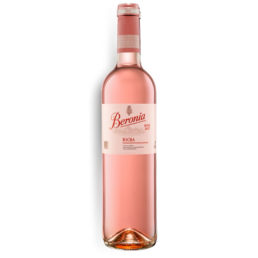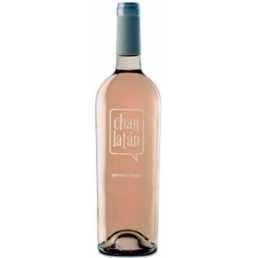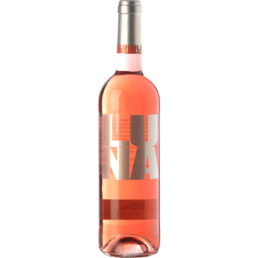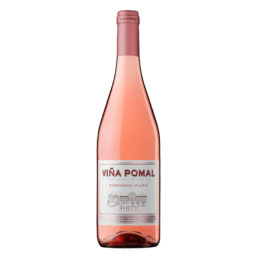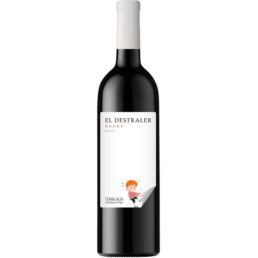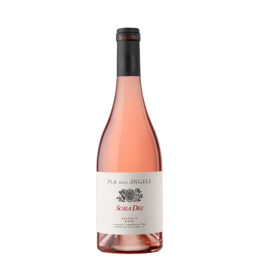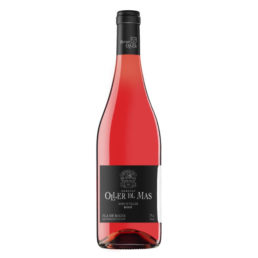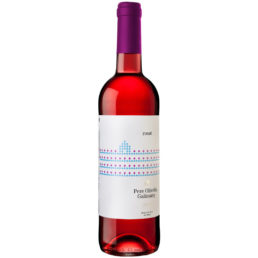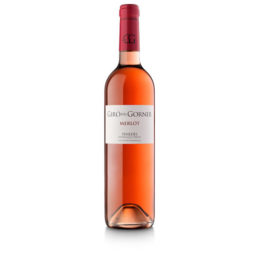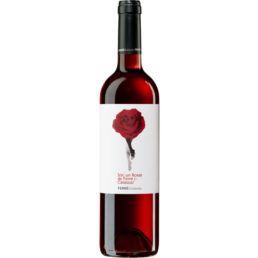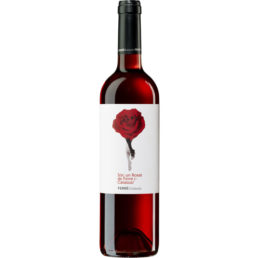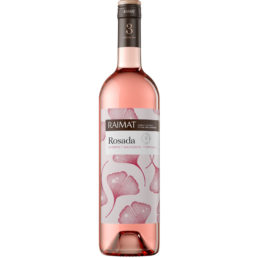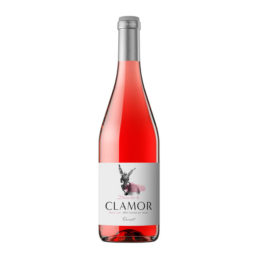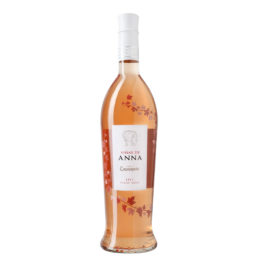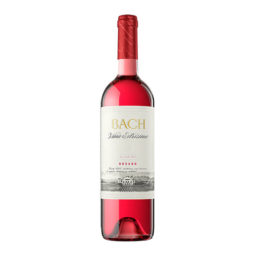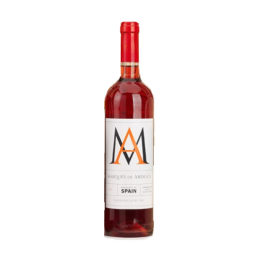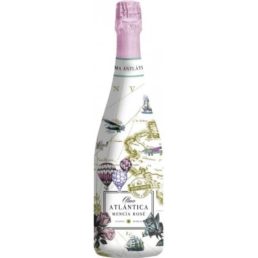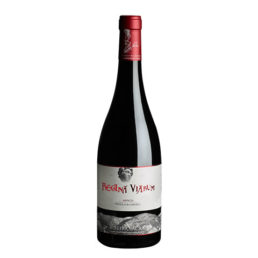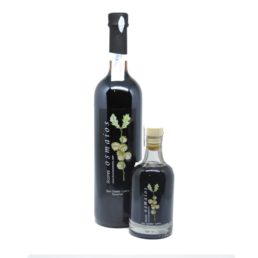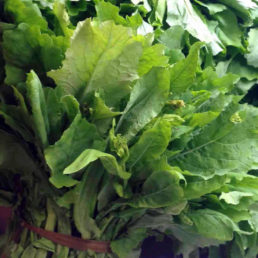Vineyards
Bordón rosado is a rosé wine dry, made from the grape varieties Garnacha tinta, from the vineyards of Rioja Oriental and Viura, from vineyards in Rioja Alta.
Rosé Wine
-
Pink cava Grand Rosé Ars Codorníu Collection 2015
Rose Art Grand Opening
The Ars Collecta range responds to the oenological legacy of more than five centuries creating cavas in Codorníu. These are made in an artisanal way at Celler Jaume, a micro-winery where innovation, research and an exhaustive previous care of the vineyards give rise to cavas of the highest quality, expressive and guaranteed longevity. Ars Collecta Grand Rosé Gran Reserva has a unique blend of the varieties: Pinot Noir, trepat and xarel lo. At the international Bacchus competition 2020 was awarded a Gold Medal. You already have one more excuse to toast with this excellent rosé cava. -
Promise rosé wine – Cellers Blanch
Vineyard: Farms of more than 20 years in the Puigpelat and Pla de Santa María areas (Alt Camp, Tarragona), manual harvest and ecological treatment. Fermentation: Fermentation takes place in steel tanks after joint pressing., making the coupage in grapes instead of once fermented generating a character of its own. Production: 500 bottles (75 cl.) -
Faustino VII Young Red Wine
Clean, bright, cherry red with garnet evolution. Nice on the nose, hints of ripe red berries and sweet sensations due to its time in the barrel. Balanced. Cool and stylish, fruit and oak notes. Half memory. Very good with any type of meat and grilled potatoes. Fish and seafood a la marinera. Half-cured cheeses and desserts with berries. Good with rice and all kinds of pasta. Very good with beans and purees in general. -
Cune Rosé Wine
Manual harvest of Tempranillo grapes and cube in a stainless steel tank where applying low temperatures prevents fermentation initially. The must, already pinkish, is bleeding between 24 and 48 hours after incubation, when we determine which color is suitable. Fermentation takes place in the liquid phase with a controlled temperature between 16 and 18ºC to maintain the aromas and fruit that characterize this wine.Type of Wine: Pink Category: Young Harvest: 2019 Grape variety used: Tempranillo: 100% -
Rosé Coto Wine
VARIETY Tempranillo, Grenache. DEVELOPMENT Rosé made in part through the bleeding of the grape flower must in the winery and in part through film maceration and subsequent pressing. The must is clarified before fermentation. Entire process of elaboration at very low temperature. -
Ramón Bilbao Lalomba Rosé Wine
What moves us on our journey is the desire to go further and discover new landscapes. When you see it, you know instantly. A dream place, able to give life to new sensations and make the world fall in love. Lalomba is our dream come true, our whim, our jewel. VARIETY: 90% Grenache 10% Viura ELABORATION: Manual harvesting of bunches in small boxes 12 Kg. That were refrigerated and transported to the warehouse where they remained in a cold environment for 12 hours. They then went through the optical selection table, obtaining the best selection of some shelled grapes, "berries" whole and in perfect condition. Then they were brought to the press, where in an inert and cold environment, the pressing process started, obtaining only the flower must. It remains in the stable process for 3 days with all its lees. after this time it is racked by gravity. After 24 h of decantation the clean must is racked in the absence of air, to initiate alcoholic fermentation in concrete tanks where the evolution of temperature will be controlled throughout the process, once the sugars are consumed, the wine will be in contact with its fine lees for 4 months. -
Faustino Art Collection Rosé Wine
Clean, bright, pretty pale pink salmon. Pink Grenache D.O.Ca. Rioja 75 cl. -
Marqués de Riscal Rosé Wine
Marqués de Riscal begins the production of rosé wines in the years 60, coinciding with the centenary of the winery, made from grapes from young vines, less than 15 years old. This rosé is made by the pressing procedure within a concept of classicism and refinement, achieving a delicacy, freshness and softness unusual in this type of wine. Fermentation takes place in stainless steel tanks at a controlled temperature between 14ºC and 16ºC to achieve great fruitiness. Grape variety: Grenache 85% Viura 10% Malvasia 5% degree: 14º -
Lalomba Rosé Wood Wine 3L Ramón Bilbao
Ramón Bilbao Lalomba Rosé Rosé Wood Jeroboam
The jewel of a singular place now in a larger capacity format.Lalomba is the exciting story of a search.
The charm of a set of charismatic vines. The commitment of a brave viticulture. The excellence of sophisticated elaboration. The vision of a brand inspired by nature and history, The space and time, sensations and knowledge. Lalomba is the definition of the purity of a great wine. -
Lalomba Rosé Wine Ramón Bilbao 1.5L Magnum
What moves us on our journey is the desire to go further and discover new landscapes. When you see it, you know instantly. A dream place, able to give life to new sensations and make the world fall in love. Lalomba is our dream come true, our whim, our jewel. VARIETY: 90% Grenache 10% Viura ELABORATION: Manual harvesting of bunches in small boxes 12 Kg. That were refrigerated and transported to the warehouse where they remained in a cold environment for 12 hours. They then went through the optical selection table, obtaining the best selection of some shelled grapes, "berries" whole and in perfect condition. Then they were brought to the press, where in an inert and cold environment, the pressing process started, obtaining only the flower must. It remains in the stable process for 3 days with all its lees. after this time it is racked by gravity. After 24 h of decantation the clean must is racked in the absence of air, to initiate alcoholic fermentation in concrete tanks where the evolution of temperature will be controlled throughout the process, once the sugars are consumed, the wine will be in contact with its fine lees for 4 months. -
Marqués de Cáceres Rosé Wine
The pink, Made exclusively with red Tempranillo grapes due to bleeding (shorter stay with the skins), It is one of the traditional wines of Marqués de Cáceres with an extensive catalog of pairings. TYPES OF GRAPE: 96% Tempranillo, 4%Grenache ink Graduation: 13,5% -
Organic & Orgasmic Rosado Bag in Box 15L
Description: Organic & Orgasmic Garnacha Rosé Wine in Bag in Box 15L
Wine format that keeps him in top condition for much longer. Organic & Orgasmic is a project that defends and promotes organic wine in bulk and source. Natural ecological wines of small local processors. sustainable viticulture, Caring ecosystem of the vineyard and learn to live with the biodiversity of sumedio without pesticides. Wines made as of old, looking for non-intervention in the process. An orgasm for the taste buds as organic wine. Certified organic farming -
Case 3 La Sastrería bottles: O.D.. Cariñena
Description: Case 3 bottles, O.D.. Cariñena tailoring O.D.. Cariñena 1 red + 1 White + 1 pink. 3 bottles 75 cl. Cardboard case. -
Rosé wine Loxarel – Petit Arnau de Loxarel (ecological)
Elaboration
Viticulture, organic and biodynamics. Fourteen hours of cold pre-fermentation maceration with the grape skins to extract the color ruby natural. The vineyards themselves are located in the Alt Penedès, at an altitude of 500m above sea level.Pairing
Accompanies very well with rice and meat and creamy (risotto), sausages and pasta. -
Rosé wine Tandem – Casual
Casual Of casualis in Latin, accidentally, luckily. Winemaking Once destemmed, the grapes macerated for seven hours in a stainless steel tank. Sangramos the must yolk, which ferments slowly at a temperature of 16 ºC -
Rosé wine- Casa Ravella Rosado (ecological)
SOURCE Alt Penedès. Penedès denomination of Origin. Own vineyards of our farm House Ravella ('ordal). DEVELOPMENT Only crops own. Manual harvest with selection of the grapes in own vineyard. De-stemming, total. After a short maceration, fermented in stainless steel tanks with temperature control. -
Rosé wine Josep Grau – L’ Efecte Volador Rosat
Viticulture and Vineyards The grapes for this wine comes from an estate of Marca (The Priorat) with clayey soils and decomposed granite. Vines 5 years of age. Organic cultivation. The work is carried out 100% manually. Winemaking The grapes are harvest and pressed slowly in a pneumatic press for a period of 6 hours to perform a extraction slow of all the aromatic potential of the variety. Ferments for 15 days in stainless steel tanks, where it will remain after 5 more months to finish maturing. -
Rosé wine Josep Grau – Regina
Viticulture and Vineyards Comes from 7 terraced terraces of Finca Partida Les Comes, very steep. The top has slate floors and the bottom is clayey. organic viticulture. All the work is carried out 100% manually. Winemaking Pressing 7 hours. Temperature controlled fermentation in foudre of 2.000 litre capacity. Parenting 7 months in the same foudre. Bottled and labeled by hand in the original bottle of the first wines of Burgundy with asymmetrical shapes. Pairing very gastronomic. You can pair with any dish. -
Rosé wine Luis Alegre – Luis Alegre Rosé 2019
Produced by direct pressing of grapes Tempranillo and Viura. Using pressure-controlled is extracted from the flower. To optimize primary aromas and high expressiveness comes at the sacrifice of a low yield (mash 60%). Fermentation constant at a temperature of 16º. -
Rosé wine Muga
Ring, Prado Enea and Torre Muga are among the best red wines of this country. Less well-known to the public is the excellent work carried out by the family Muga to when you develop your pink, one of the best that can be found in the D. O. Ca. Rioja: Flower of Muga Rosé 2017, mainly produced with grapes of garnacha. While the bodega Muga used for the red wines the garnachas grown in the foothills of the montes Obarenes, with a good ripening of the fruits by exposure to the sun, for the pink use bunches of garnacha from the hillside opposite, where a lower stroke allows for better freshness and preserve the fruit notes tangy and fresh, features of this Muga Rosado. The wine was fermented in small tanks made of wood and remained four months growing up with the fine lees and expanding its virtues. Elaboration After 12 hours of maceration, the wine ferments for 15-20 days in small containers of wood between 16- 18ºC. During 3 months maintain and work the fine sediments that magnify and enhance their virtues and organoleptic. Later we stabilized and cold filtered and bottled. Pairing with tartar of fish, ceviches, salads, folders, rice... -
Wine Flower of Muga Rosé
Ring, Prado Enea and Torre Muga are among the best red wines of this country. Less well-known to the public is the excellent work carried out by the family Muga to when you develop your pink, one of the best that can be found in the D. O. Ca. Rioja: Flower of Muga Rosé 2017, mainly produced with grapes of garnacha. While the bodega Muga used for the red wines the garnachas grown in the foothills of the montes Obarenes, with a good ripening of the fruits by exposure to the sun, for the pink use bunches of garnacha from the hillside opposite, where a lower stroke allows for better freshness and preserve the fruit notes tangy and fresh, features of this Muga Rosado. The wine was fermented in small tanks made of wood and remained four months growing up with the fine lees and expanding its virtues. Elaboration After 12 hours of maceration, the wine ferments for 15-20 days in small containers of wood between 16- 18ºC. During 3 months maintain and work the fine sediments that magnify and enhance their virtues and organoleptic. Later we stabilized and cold filtered and bottled. Pairing with tartar of fish, ceviches, salads, folders, rice... -
Rosé wine Bordón
Elaboration De-stemming of the bunches and light crushing of the grapes. The fermentation is made in contact with the skins (grape skins) during 12 hours in stainless steel tanks at a controlled temperature of 20 ºC. Pairing Hors d'oeuvres, light dishes, white meat. -
Wine rosado Bodegas Baigorri – Baigorri Rosado
Rosé wine elaborated with grapes of the variety Tempranillo and Garnacha, grape depalillada and hand-selected, using selection tables and vibration. Fermentation with indigenous yeasts specially selected low temperature in stainless steel tanks, together with their lees. Bottled, avoiding as far as possible, oxidation, in the month of February. Pairing It is a wine particularly suitable for snacks of any kind, fish and seafood . -
Rosé wine Beronia – Beronia Rosé
VINIFICATION AND AGEINGBeronia Rosado performs a cold maceration of must in contact with skins, getting to extract the primary aromas from the Grenache and a subsequent alcoholic fermentation for fifteen days.PAIRINGIdeal to accompany salads, rice and pasta and white fish in all their different elaborations, as well as white meat and little fat. -
Rosé wine Caesar Prince – Charlatan
The words flow with agility, there is a great struggle for intervening in the conversation, there is a huge desire of communication... it is the time of "charlatan". A wine dedicated to the lovers of the talk, to the big talkers, as we are... let us know what you know well! Charlatan it is the latest innovation from the winery, a rosé wine that is far from the classics that are made in the Denomination of Origin Cigales. It is made with the grape Garnacha Tinta but his direct pressing and fermentation at low temperature favors a pink color, very pale, without losing the aromas of fruit and flowers typical of the variety. A pink with a soul of white. ‘Charlatan’ is a wine modern, relaxed and without complexes, eye-catching and festive. A pink to make you cool in any occasion. -
Rosé wine Caesar Prince – Clarete de Luna
Have that, before you begin the harvest, the vineyards were visited in the night by some neighbors friends others. In times when the need was the greatest company of the peoples, it was called “Clarete de Luna” the wine, which made those who did not have vineyards own, so apañaban with the other, yes, discreetly. Only the moon was witness of that feat. They were times in which the wine was important complement to the food, the claret was accompanied by the site and lunch, happy the sad and stews and help you to take better penalties. This wine is a tribute to all those who once needed and that today we enjoy. This is a wine made with Tempranillo, mainly, and white varieties such as Verdejo or Albillo. Cool, fun, sweet to all the public... and all the days. -
Rosé wine of Bodegas Bilbaínas – Viña Pomal
First pink of Viña Pomal. It is made with a 70% of Grenache and a 30% of Viura, traditional varieties for rosé wines of Rioja. Able to satisfy wine lovers classic but has an edgy touch.DEVELOPMENT (VINIFICATION)Viña Pomal Pink is produced by the method of “bleeding”. Once received the grape in the winery is performed the process of destemming and crushing traditional, and encuba in a warehouse where we make a slight maceration in cold for at least 12 hours. When the color of the juice is the desired, it makes the “bleeding” that consists in separating the grape must tear the skins. This wort is fermented at a controlled temperature of 14 ºC, keeping the aromas and the freshness of the wine.VINEYARD (VITICULTURE)From vineyards located in the Rioja Alta, area of atlantic influence with soils of heterogeneous low fertility and texture specific. With these characteristics, the varieties Garnacha and Viura, traditional rosé Rioja, they offer their maximum fullness to get a pink wine color only, acidity is a feature that provides freshness and youth and nuances varietals that make the long and expressive.PAIRINGViña Pomal Pink goes with all kinds of incoming, stew and salad as well as pasta, pizza and rice dishes. Also Ideal for pairing with dishes with seafood and blue fish. -
Rosé wine, Scala Dei – Pla dels Àngels
Another of the faces of Grenache. Pla dels Angels is the first pink of Cellers Scala Dei, prepared by their winemaker, Ricard Rofes, which has managed to develop this fragrant, fresh and delicate rosé wine from a selection of grapes from dand vineyards high on clay soils. Has been selected as one of the 10 best rosé of the world 2015 “The Global Rosé Masters”, competition organized by the prestigious magazine Drink Business.DEVELOPMENT (VINIFICATION)To preserve the aromatic characteristics of the Garnacha, it cools the grapes on their arrival warehouse up to the 2 ºC, is despalilla, and after 3 hours of maceration with skins starts bleeding in deposit to get this pale color and attractive. Subsequently desfanga and it is the fermentation as if it were a white wine. After the fermentation is in tank for about 4 months, until comes the time of bottling.VINEYARD (VITICULTURE)Grapes from the high areas of Scala Dei, the D. O. Q. Priorat, on soils argilosos that retain the acidity and, therefore the freshness of the grapes at the time of the grape harvest. Vineyards young and old, predominantly orientations north and east, located between the 500 and the 600 meters of height.AWARDS91 POINTS YEARBOOK OF WINES (THE COUNTRY) 201890 POINTS GUIDE PEÑÍN 201890 POINTS GUIDE 365 DAYS (LIVE THE WINE) 2018 -
Rosé wine – Bernat Oller rosé
Production: 1.577 bottlesWinemaking:Merlot bleeding with three hours of maceration.Picapoll direct pressing, soaked an hour in cold. Fermentation in different reservoirs during 21 days at 16ºC.Four months into parenting mothers total with a return to weekly. -
Rosé wine Pere Olivella Galimany
The origin; vineyards of the finca's own farm Can Pere del Maset. The plot of the Sierra, planted in 1999 is in charge of producing this Cabernet Sauvignon. Vines with vegetal cover spontaneous to support biodiversity and the ability to regulate the water retention of the soil in a natural way. Viticulture dry, do not irrigate. Rational use and fully controlled from the copper and sulphur to try to minimize your use. We use sexual confusion to control Lobesia botrana (the european grapevine moth). Only use organic fertilizers. The harvest is performed in its optimal state of maturation phenolic, in the early morning hours, by the control of the temperature. Selection in the own vineyard, only the best grapes will be selected, harvesting by hand to ensure maximum quality of the grape. Elaboration: Processing by gravity in the winery, derrapado and later crushed soft grape. Cold maceration of the skin with the pulp of the grape for a few hours for the extraction to a desired color and of different aromatic compounds, after performing the alcoholic fermentation at low temperature and very slowly. Pairing: It is a wine that is great for snacks, allows a wide selection of dishes and various cuisines. Highly recommend it but some dishes that we can harmonize perfectly with this wine, the pasta (pizzas varied, gnocchi al funghi, raviolo stuffed brie cheese with prawns, ...) carpaccio of salt cod or tuna, and some rice. It is also a good ally of the oriental cuisine. -
Rosé wine Giró del Gorner
The complex elaboration of a wine rosé does not do honor to their recognition. Difficult it is to find the perfect balance of color and aromas. Harvesting the grapes the grapes in the right moment of maturation, early morning when it is cooler, to be able to macerarla with their skins and extract the color and aromas typical of the variety, maintaining this delicate cherry color. We appreciate your joyful color and red fruit in the mouthElaboration:
Maceration between 8-18 hours of grape mash at a low temperature, 8ºC. The fermentation takes place between 10 and 15 days, low temperature, with the aim of fostering the training of primary aromas typical of the variety.
Pairing
His character fresh and cheerful accompanies perfectly cured meats, folders, meat light, poultry, as well as oriental food.
-
Rosé wine Ferré i Catasús – Sóc a Rosat
“I am the happiness and the love, I am the delicacy, I am the femininity, I illuminate each day, I am a smile, Sóc un Rosat de Ferré i Catasús. " This rosé expresses the finesse and softness of Merlot, without ceasing to be aromatic and full-bodied, and without forgetting the greatness of belonging to the family of the Cabernet Elaboration: Vintage mechanical harvested at night at the optimal point of maturity. Cold pre-fermentation maceration during 6-8 hours. Fermentation in a tub of stainless steel to 15 -16°C. Pairing: With its ruby color and a graduation average, you can serve it with rice and pasta, providing the smoothness and balance that they need, but you can also enjoy with a fruit salad, combination that certainly will not leave indifferent to the lovers of good wine and the mediterranean diet. -
Rosé wine Ferré i Catasús – Mas Suau
“I'm from here, this is my land, my farm, my animals, my life, I am a simple beauty, direct, I am soft, I am Mas Suau de Ferré i Catasús. ” Mas Suau is the promise of a pleasant moment, a moment of each day, whatever the occasion, to enjoy a glass of wine. Elaboration: Vintage mechanized. Vinifcación of the varieties separately, and temperature-controlled fermentation at 16 º c. Pairing: Mas Suau rosado is ideal to combine with fish to the plate, as well as meats and rice dishes. -
Rosé wine Raimat Pink
In the finca Raimat is common to see the presence of roses in the vineyards. The rose is an ideal companion for the vid, as the roses help to detect early a disease that affects them. Every morning, the petals of all the rosas they refreshed by the dew of the morning giving us the most beautiful awakenings. This wine is a tribute to these facts. Raimat Pink is a wine of pale pink gloss, that is similar to the petals of the first rose of spring. Elaborated with the varieties Cabernet Sauvignon and Tempranillo, for this pink only intended the first must, the more fragile and delicate but at the same time, more elegant, fresh and aromatic. DEVELOPMENT (VINIFICATION)The harvest is performed at night, taking advantage of the lower temperatures and quickly, to preserve the primary aromas. To reach the winery, after de-stemming and once achieved a temperature of 10 ºC, the grapes are sent directly to the press to proceed to the extraction of a very soft. The methodology that we use in Raimat is unusual; the winemaker decides on the basis of the target color what percentage of the flower must be intended to this wine. Then, for this pink, only intended the first must, which is more fragile and delicate but at the same time, more elegant, fresh and aromatic. It, it ferments to 14 ° C to preserve all the aromatic complexity of the two varieties.PAIRINGRaimat Pink is the wine-gastronomic excellence, marries perfectly with blue fish (tuna, salmon or sardines), pasta dishes, pizza; rice, caps, salads vegetable, vegetables, with birds, of dark meat such as quail or pheasant. -
Rosé wine Raimat Clamor
Cry is the name given to the lower part of the mountain where they grow the vines that produce this wine. Their grapes are developed pink, red and white. A privileged spot of the finca Raimat which gives rise for years, one of the best-known wines of the house.Pairing
Pair with vegetables, white meat, rice, soft cheeses and fish. Also with casual dishes such as pizza, fried and pates. -
Rosé wine Vineyards of Anna
DEVELOPMENT (VINIFICATION)The harvest is done in the night, taking advantage of the lower temperatures and quickly, to preserve the varietal aromas and prevent oxidation of unwanted. To reach the winery, is performed a pressing immediately after, during 24-48h to make a natural clarification at low temperatures. The winemaker decides on the basis of the target color what percentage of the flower must be intended to this wine, which is more fragile and delicate but at the same time, more elegant, fresh and aromatic. Once clean, the wort, is decanted into a stainless steel tank with cooling system for performing a controlled fermentation between 16-18 ºC. After the alcoholic fermentation, the wines are preserved in tanks, avoiding oxidation, until the time of bottling.PAIRINGVines of Anna Pinot Noir is the wine-gastronomic excellence, that marries with a large amount of dishes to perfection. A perfect complement to dishes that contain fish blue (tuna, salmon or sardines), rice, and pasta. Also Ideal pairing with salads, fruits, vegetables, with birds, of dark meat such as quail or pheasant. Ideal to enjoy by the glass with all kinds of caps. -
Rosé wine Viña extrísima pink dry Masia Bach
Masia Bach was founded early last century by the brothers Pere and Ramón Bach, manufacturers of tissues. They wanted to link the best cotton tradition with viticulture, giving the name of the best cotton "Extrísimo" to the best vineyards where Masia Bach wines historically came from. Winemaker's advice The wine is expected to reach its maximum fullness during the first year, keeping in good condition one year plus. Store in a dry place without exposure to direct sunlight. Pairing Ideal to accompany a multitude of dishes; from sausages, rice and pasta, until fish flesh as firm as monkfish, cod, tuna and white meat. -
Marques de Ardoza Pink
Nice pink wine table, built with red grapes . Shows a bright color with flashes violacéos dark. Eleganta and persistent on the palate To accompany pasdtas and rice, serve between 14 - 16Th Producidop by Vinigalicia 11th vol -
Wine Dona Delfina Pink 2014 – Roandi
DONA DELFINA PINK, it is wine pink quiet of Roandi. Elaborated from selected grapes of MENCIA and ALBARELLO, he made a maceration at low temperature and a light pressing to get the bright color characteristic of this wine. The fermentation is done in stainless steel tank at a temperature of 16ºC, getting a wine very aromatic, fresh and lively. Nice raspberry color, with nuances of roses, clear and bright. Intense on the nose, with memories of red fruits like currants, cherries, strawberries or raspberries. I remember floral roses. The palate, it is soft, fresh and balanced.












